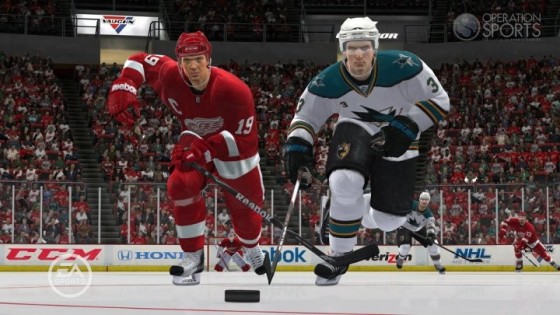 Submitted on: 12/01/2011 by
Jayson Young
Submitted on: 12/01/2011 by
Jayson Young
Sports games, sadly, no longer come with instruction manuals. While ratings like "Slap Shot Power" need no written explanation, figuring out what attributes like "Aggressiveness" actually do on the ice can be confusing.
Buried deep within NHL 12's maze of menus, players can find detailed explanations for most of the game's attributes. Consider this ratings guide as part of the "written manual" that NHL 12 should have come with.

Offensive Ratings
Deking
With a high deking rating, loose-puck dekes are easier to complete. Goalies are more easily fooled by the skater's right-stick dekes, and the player can shoot more accurately following a deke.
Hand-Eye
Determines a player's deflection skills in front of the net. It also affects the player's accuracy on one-timers and the ability to handle fast passes.
Offensive Awareness
Awareness improves the player's ability to gather loose pucks in the offensive zone. The attribute also adds a bit of "auto-aim" to the player's shot, helping the puck travel through tight spots and into the back of the net. Increases the player's range of "vision" (see Passing).
Passing
Determines the accuracy of "blind" passes outside of the player's vision. Misaimed passes are automatically corrected with a high passing rating. Automatic saucer passes are also performed with a high rating. Increases the chance of getting passes through traffic, making your passes harder for defenders to intercept. Your passes will also be easier to control for receiving players.
Puck Control
This attribute affects the player's ability to maintain control of the puck through poke checks, stick lifts and body hits. Puck control also determines whether or not the player can perform "on-knee" dekes after being tripped from behind during a breakaway.

Defensive Ratings
Aggressiveness
Increases the chances of a "big hit" animation. High aggressiveness adds an "intimidation" effect to big hits. Intimidated players will have weaker shots, less-accurate shots, poor pass accuracy and reduced hitting ability.
Body Checking
The checking rating affects the severity of hits. A high rating gives the player the ability to deliver more effective body checks.
Defensive Awareness
Improves the player's ability to gather loose pucks on defense. A high rating automatically triggers certain defensive animations like batting airborne pucks safely away. For computer players, the rating affects how well they pay attention to the puck, including their ability to not get deked out, take away passing lanes and forecheck/backcheck.
Discipline
Affects the likelihood of being called for elbowing. High discipline also reduces penalties during the stick lift and poke check animations. Penalties like boarding and checking from behind are not affected.
Faceoffs
The winner of a faceoff is determined by several factors, including the attribute rating. The stick lift and tie-up techniques don't seem to be very affected by the faceoff rating. But winning a faceoff with a clean pass back or a deke forward is highly dependent on the player's faceoff rating. See the full faceoff guide for greater detail on winning faceoffs.
Fighting Skill
Affects punching power and stamina during fights.
Shot Blocking
Determines how quickly a player recovers from blocking a shot. Players with a high rating are more likely to get the "diving" shot block animation rather than the less-effective "standing-up" animation.
Stick Checking
Affects the success of poke checks and stick lifts. Decreases the likelihood of committing a penalty while stick checking.

Athleticism Ratings
Acceleration
Determines how quickly a player reaches top speed.
Agility
Allows the player to make quicker, sharper turns. A high rating decreases the amount of speed lost while turning.
Balance
Affects the player's ability to maintain control the puck while being hit. High balance prevents the player from being knocked over during hits, including those delivered on opponents.
Durability
Decreases the chance of injury during hits and shot blocks. In the EASHL, skaters play through all injuries but will have their attributes temporarily reduced until the end of the game. A player can have multiple injuries during a game, as injuries are body-part specific.
Endurance
A low endurance rating causes the player to fatigue quickly. Fatigue affects the player's skating, shooting and hitting ability. Endurance also determines the rate at which a player recovers energy while "gliding" or not skating.
Speed
Determines a player's top speed. Players cannot maintain top speed throughout a game unless they have a high endurance rating.
Strength
Provides a boost to shot power, fighting ability, hitting ability and resistance to hits. Strength also improves the player's ability to pin an opponent using the boardplay button or escape a pin from another player.









